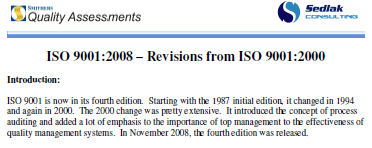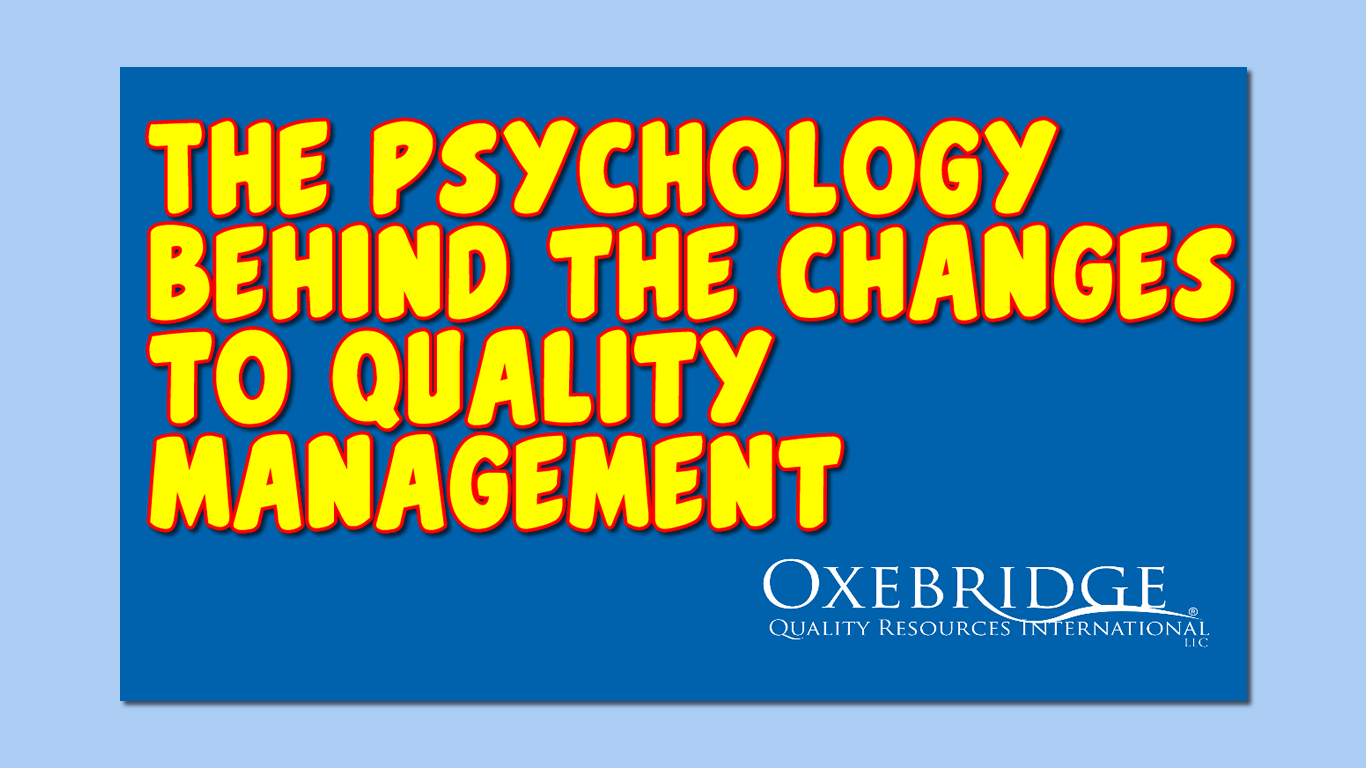Winter Haven FL — Oxebridge Quality Resources International has filed a formal complaint and request for corrective action against Smithers Quality Assessments, an ANAB accredited registrar of ISO 9001 and AS9100 quality management systems. The complaint alleges an improper relationship between Smithers and the ISO 9001 consulting firm launched by its former Chief Operating Officer, John Sedlak.
A document obtained from the Smithers website, entitled “ISO 9001:2008 – Revisions from ISO 9001:2000” and marketed by Smithers as a transition checklist for companies seeking to “upgrade” to ISO 9001:2008, appears to show a clear collusion between Smithers and Sedlak Consulting LLC. The document features both companies’ logos on the top of each page, shares copyright notifications on the footer of each page, and the document’s file name includes both companies’ names.

Furthermore, the final page of the document includes both a blurb about Smithers Quality Assessments and Sedlak Consulting. The document clearly states that John Sedlak “led” Smithers, and his role is defined as former VP and COO of Smithers on the Sedlak Consulting website.
![]()
As of November 3, 2010, the document is not readily accessible from the website and may have been removed. It may still be accessed by downloading the document from this link (PDF file – 157 KB).
Accreditation rules governed by ISO 17021 bar registrars from co-marketing services with any single consulting firm, and vice versa. Specifically, clause 5.2.9 reads:
“The certification body’s activities shall not be marketed or offered as linked with the activities of an organization that provides management system consultancy. The certification body shall take action to correct inappropriate claims by any consultancy organization stating or implying that certification would be simpler, easier, faster or less expensive if the certification body were used. A certification body shall not state or imply that certification would be simpler, easier, faster or less expensive if a specified consultancy organization were used.”
Oxebridge alleges that the co-marketing of this document not only clearly violates the rule against “linking” the activities of a registrar and a consultancy, but the document itself also infers — if not directly declares — that using it will make transition to ISO 9001:2008 easier; since the document was developed by Sedlak Consulting, and includes contact information and a promotional blurb about the consulting company, this transitively results in an endorsement of Sedlak Consulting by Smithers.
Unrelated to the complaint is the fact that the document itself includes misleading information on the ISO 9001:2008 standard. The document states (emphasis by Oxebridge):
The completed checklist will provide one form of objective evidence … that your organization has completed an analysis of ISO 9001:2008 and, if applicable, made required changes to its QMS.”
As discussed in an earlier Oxebridge post, ISO 9001:2008 contains no new requirements, and companies need to nothing to their quality management systems to automatically have their certifications updated to the 2008 version, provided they maintain their regular schedule of surveillance audits by their accredited registrar. Registrar auditors cannot require evidence, nor write any nonconformances, against a company for failing to make changes to an ISO 9001:2000 system in order to comply with ISO 9001:2008, since the standards are — from a requirements standpoint — identical.
Under accreditation rules, Smithers must process the complaint in a timely fashion and take corrective action if warranted, or face escalation of the problem to ANAB, the body which holds Smithers accreditation.
The need for a strict firewall between consulting firms and registrars is important in order to ensure the validity of resulting certified quality systems. Early in the history of ISO 9001, Perry Johnson Registrars was forced to split its consulting division away, and the company was divided into a registration company and a consulting firm, owned by separate individuals. The former accreditation body RAB was itself split into two organizations on similar grounds, resulting in the current accreditation body ANAB and the auditor training organization RABQSA.
Oxebridge files requests for corrective action on behalf of its clients, or itself, from registrars, accreditors, trainers and others in the ISO 9001 community, in order to ensure compliance with the standards, rules and regulations that aim to ensure the integrity of ISO 9001 certification. To date, Oxebridge has filed complaints against BSI, NQA, Intertek, Underwriters Laboratories, and SGS, in all cases alleging violations of the accreditation rules. Most of the complaints are resolved internally by the registrar, but occasionally these are escalated to ANAB; in all cases, Oxebridge abides by whatever final decision ANAB decrees.
Oxebridge will report the actions taken by Smithers, and any necessary escalation, here on its official website.
Christopher Paris is the founder and VP Operations of Oxebridge. He has over 35 years’ experience implementing ISO 9001 and AS9100 systems, and helps establish certification and accreditation bodies with the ISO 17000 series. He is a vocal advocate for the development and use of standards from the point of view of actual users. He is the writer and artist of THE AUDITOR comic strip, and is currently writing the DR. CUBA pulp novel series. Visit www.drcuba.world







